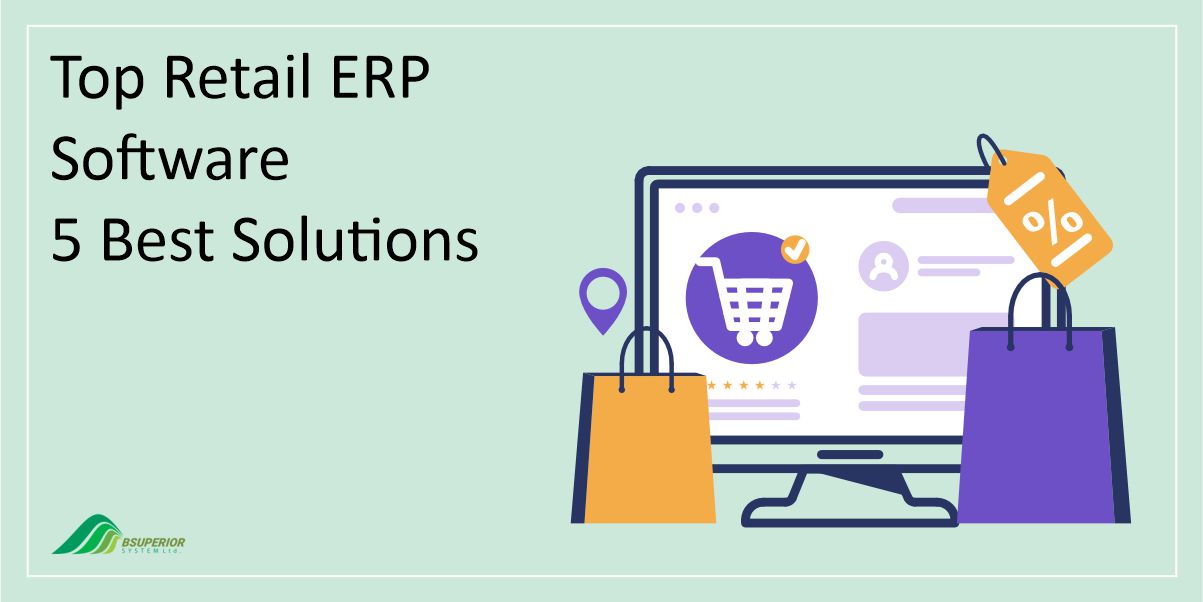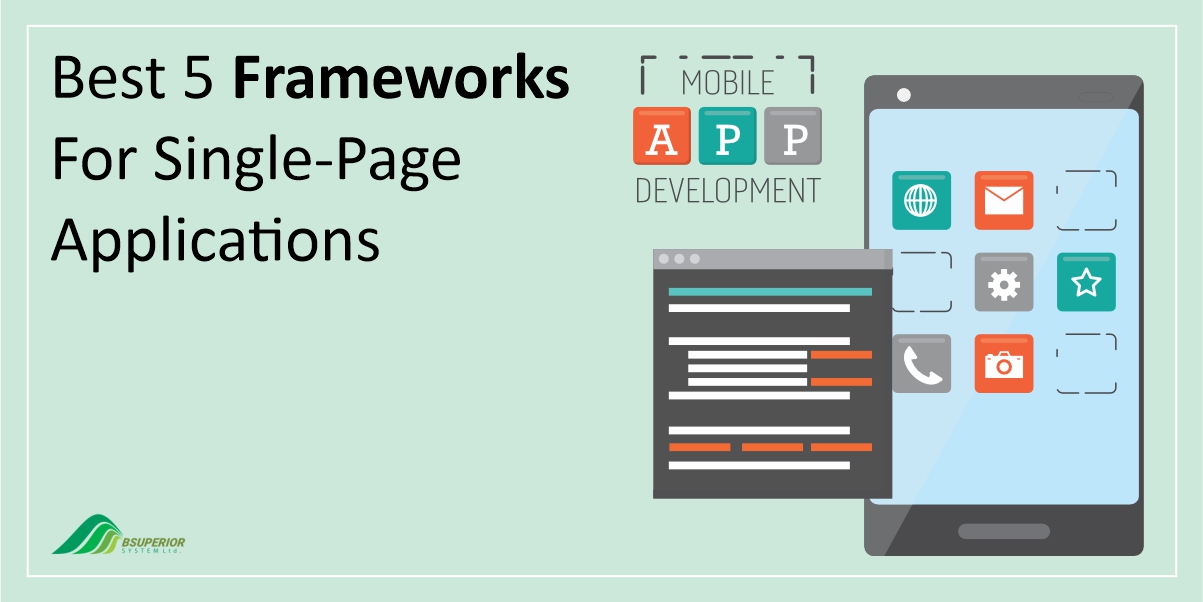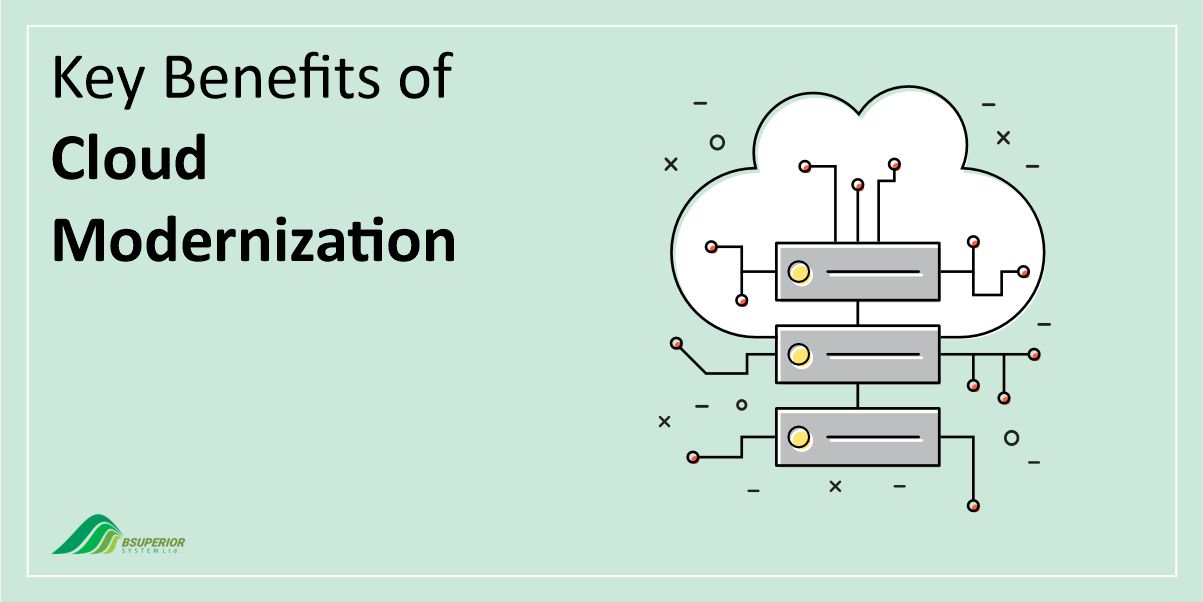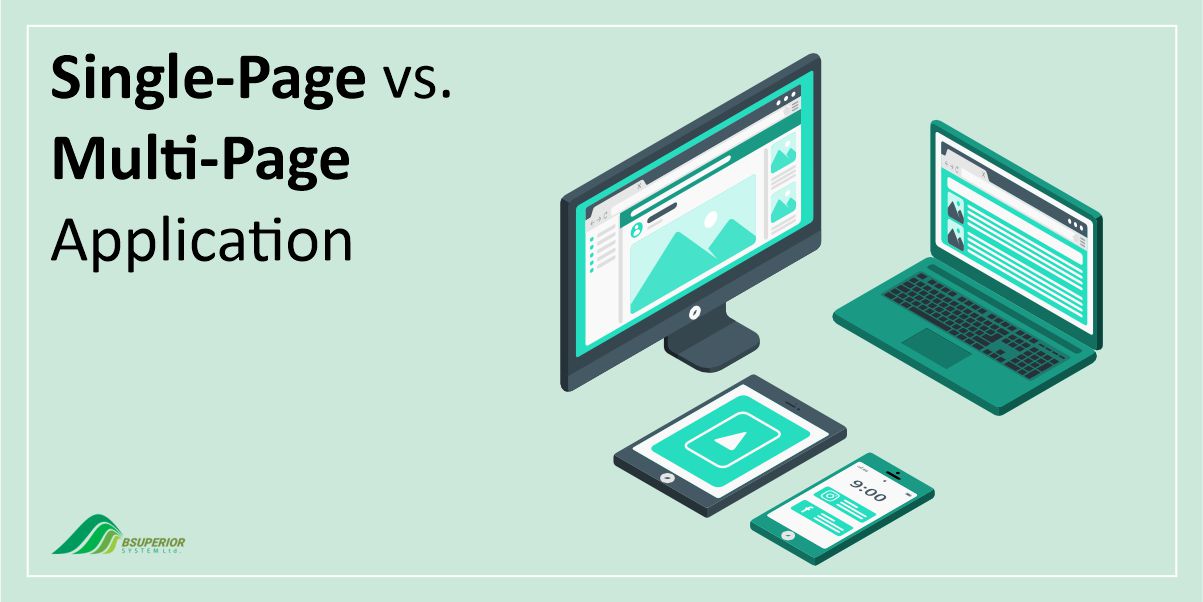Best Food and Beverage ERP Solutions in 2024
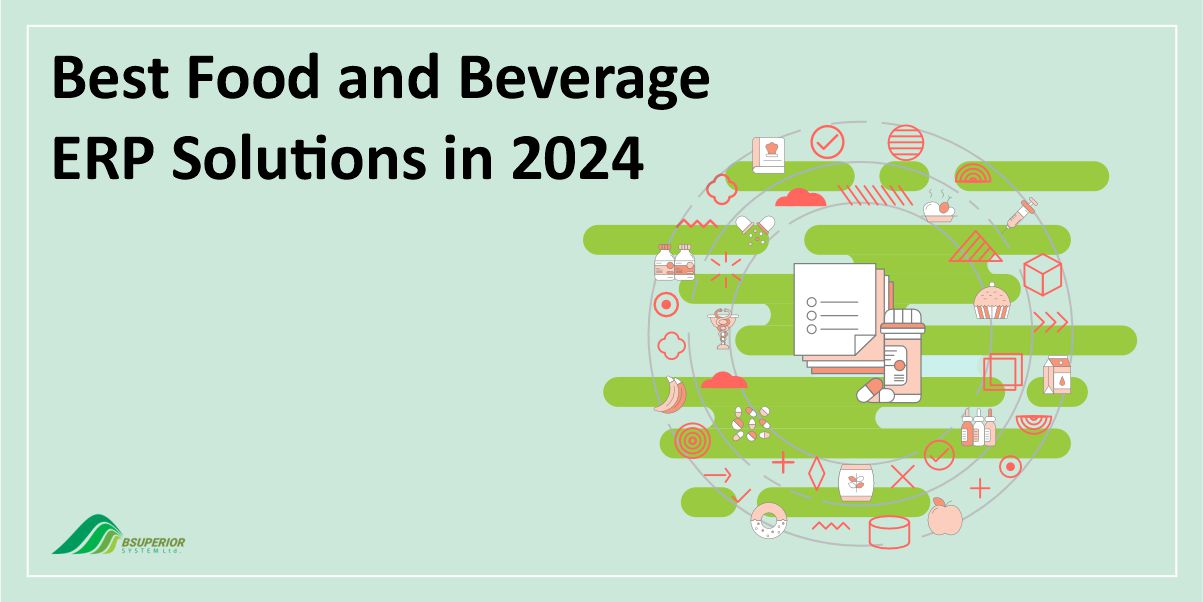
It is no secret that choosing the right ERP software is essential for food and beverage companies.
A good ERP system will help you manage everything from recipes and production schedules to keeping track of ingredients and making sure food is safe.
That’s why, in this blog post, we’re going to share with you some of the best ERP solutions that you can rely on for your food and beverage business.
What is Food and Beverage ERP?
ERP software has become a crucial tool for businesses that offers a real-time, integrated view of various operations through a single system.
However, not all ERP systems can cater to the specific needs of every manufacturer. Food and beverage manufacturers, in particular, require a system that addresses their unique challenges and streamlines processes beyond what traditional methods can offer.
This is where food-specific ERP solutions come in. They are designed to address the unique challenges and complexities faced by food and beverage companies.
As the industry flourishes, smaller and medium-sized players are realizing the limitations of traditional spreadsheets and point solutions. They need a more integrated and automated approach to minimize human error and optimize operations.
Read more: What is ERP Finance Module? Key Features and Benefits
Food and beverage manufacturing comes with unique responsibilities. Products are perishable, and ensuring a consistent, safe, and high-quality experience is paramount.
From managing shelf-life and sourcing safe ingredients to adhering to strict labeling and packaging regulations, the juggling act is real. Traditional methods simply can’t keep up with the increasing demand and growth in the industry.
Food-specific ERP software is the answer. It helps companies streamline these complex processes, and makes sure that they stay organized, efficient, and competitive in the ever-evolving food and beverage landscape.
How Can ERP Benefit Your Food and Beverage Business?
Making use of an ERP system for your food and beverage business will help you in a number of important areas.
1. Safety and Compliance:
Food ERP software helps you prioritize safety and compliance, which is absolutely necessary for protecting your customers and maintaining a positive reputation.
ERP makes sure that you take proper safety measures, such as applying correct food labels, maintaining shelf life standards, displaying allergen information, and requiring employees to wear protective gear.
2. Transparency and Traceability:
Food ERP software provides tools to track the entire journey of your products, from raw ingredient origins and nutritional values to the final delivery to customers. This transparency allows you to:
- See where your ingredients come from
- Know the nutritional value of your products
- Track where your products are shipped
- Ensure your suppliers are reliable
- Make sure customers get their products on time
3. Improved Quality:
Food ERP helps you ensure your products are high quality. In other words, it makes sure that your customers get the best possible products. It allows you to:
- Set and maintain quality standards
- Track and address any quality issues
- Quickly fix problems or start new batches
4. Better Inventory Management:
Maintaining accurate inventory levels is crucial in any manufacturing industry. Food ERP software helps you:
- See how much of everything you have in stock
- Set minimum and maximum stock levels
- Avoid running out of ingredients or having too much on hand
- Identify and remove spoiled items
5. Increased Productivity:
By combining centralized data, stricter quality control, automation, and comprehensive inventory management, food ERP software can streamline your operations, leading to:
- Faster production
- Timelier deliveries
- Enhanced customer satisfaction
- Ship products on time
Read More: 6 Best ERP For Supply Chain Management in 2024
Key Factors to Consider When Selecting a Food and Beverage ERP
There are a few key things to think about when selecting an ERP system for your food manufacturing company. These are:
- Experience: Look for a vendor with extensive experience in implementing ERP systems specifically for food manufacturers.
- Cost: Consider both the initial cost of licensing and ongoing costs associated with implementation, maintenance, and any potential upgrades. Choose a solution that fits your budget without compromising functionality.
- Methodology: The ERP system that you decide to work with must align with your business goals and growth strategy.
So, choose a vendor that understands your specific needs and can tailor the implementation process to help your business grow efficiently.
Top Food and Beverage ERP Systems
Below, we’ll explore 6 top ERP systems designed specifically for food and beverage businesses to help you find the best fit for your company’s needs. These ERP solutions are:
1. SAP Business One
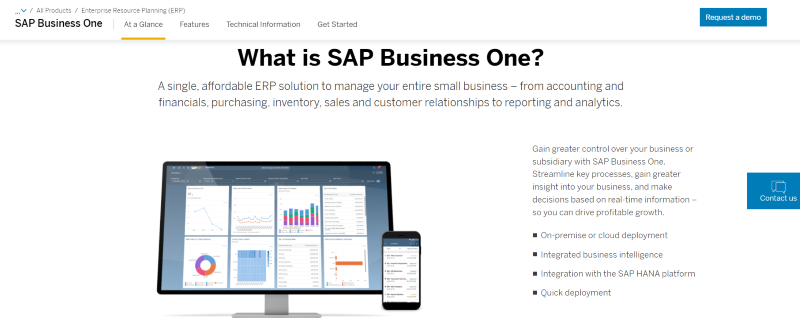
SAP Business One is an all-in-one solution for small and medium-sized companies. It streamlines operations by integrating various departments, including finance, sales, supply chain, production, project management, and production processes.
Beyond its core functionalities, SAP Business One caters specifically to the food industry by offering robust inventory management, efficient production planning, and stringent quality control.
Main Features
- Industry-Tailored Solutions: SAP Business One offers features designed specifically for the challenges and needs of food and beverage businesses.
- Streamlined Operations: It enhances your efficiency and optimizes resource utilization with features that help you streamline your workflows.
- Improved Traceability: With SAP Business One, you’ll gain increased visibility throughout your supply chain with improved traceability functionalities.
Pros
- SAP Business One offers extensive customization options.
- SAP Business One provides powerful business intelligence (BI) tools to analyze data and make informed decisions.
- It helps you stay connected and manage tasks on the go with native mobile apps for iOS and Android devices.
- You can choose the database engine that best suits your needs, with options for SQL Server and SAP HANA.
Cons
- Pricing is not readily available, i.e. a phone consultation is required for a quote.
- Setting up and configuring the system often requires assistance from a Value-Added Reseller (VAR).
- SAP Business One does not include a payroll module and has a limited chart of accounts.
Rating

SAP Business One has earned a rating of 4.3 on the G2 website.
2. Genius ERP
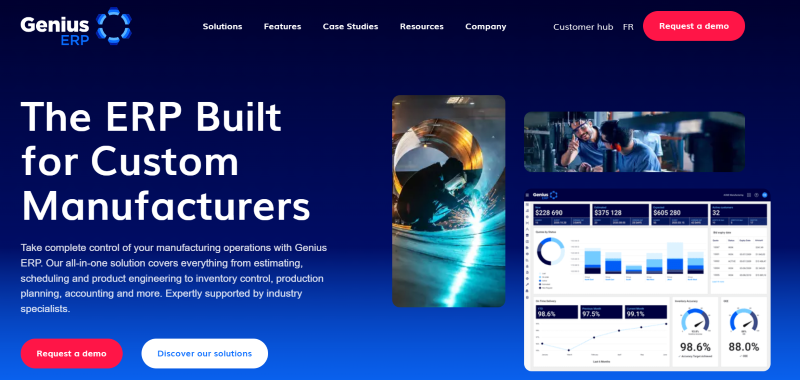
Genius ERP enables small and medium-sized enterprises in the food manufacturing sector with a comprehensive solution for managing high-variability production processes.
It covers the entire process, from planning and execution to measurement and improvement. Furthermore, Genius ERP connects all aspects of your business into a single, easy-to-use platform.
Main Features
- Product Engineering: Genius ERP converts CAD designs into Bills of Materials (BOMs) and Requests for Quotation (RFQs).
- Project Management: It ensures reliable on-time deliveries with intuitive purchasing functionalities, including pre-ordering long-lead items.
- Sales CRM: Genius ERP tracks sales opportunities and monitors your pipeline in real-time, all within the integrated Genius ERP and CRM system.
- Quality Control: Genius ERP implements effective quality control measures by generating non-conformance reports (NCRs) and tracking corrective actions.
- Rest API: It connects your ERP system with third-party applications, websites, and custom programs to share real-time information with dealers and customers.
Pros
- Genius ERP has an intuitive interface, and it is quite easy for users to learn and navigate.
- Genius ERP includes a dedicated engineering module.
Cons
- While offering a wide range of features, managing individual modules within the system can be complex.
- Accessing new features and functionalities through software updates often requires additional fees.
Rating

Users on G2 have rated Genius ERP positively with 4.3 out of 5 stars.
3. SYSPRO
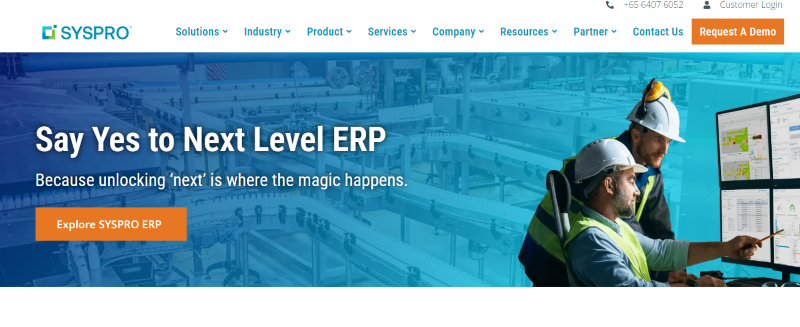
SYSPRO is a popular choice among food and beverage clients. It excels in both manufacturing and distribution and thus is a highly relevant option for this industry.
One of SYSPRO’s key strengths is its flexibility. It caters to diverse business processes and workflows within the food and beverage sector.
This flexibility stems from its high level of customization. Users can personalize and modify the software without needing to touch the underlying code.
Read more: ERP in Supply Chain Management: Use Cases and Benefits
Main Features
- Global Support Network: With SYSPRO, you can access a network of partners spread across 60 locations who can provide training, support, marketing benefits, and additional revenue opportunities.
- Streamlined Operations: SYSPRO consolidates your operations and manages data using the Microsoft.NET SQL database.
- Improved Production Management: SYSPRO gives you access to tools such as bill of materials management, inventory tracking, reporting, and project management.
- Advanced Quality Control: SYSPRO allows you to conduct multiple product evaluations, including those involving complex chemical processes. You can also document inspection findings and adjust quantities for optimal quality control.
Pros
- SYSPRO offers industry-specific ERP solutions.
- It features advanced inventory management functionalities.
- SYSPRO has a user-friendly interface.
- It offers a comprehensive suite of features to manage various aspects of your business.
Cons
- SYSPRO has limited features for human resource management.
- Compared to some other options available, SYSPRO may have a higher price point.
- SYSPRO doesn’t offer a free trial.
Rating

SYSPRO is rated 4.1 by users on the G2 platform.
4. IFS ERP
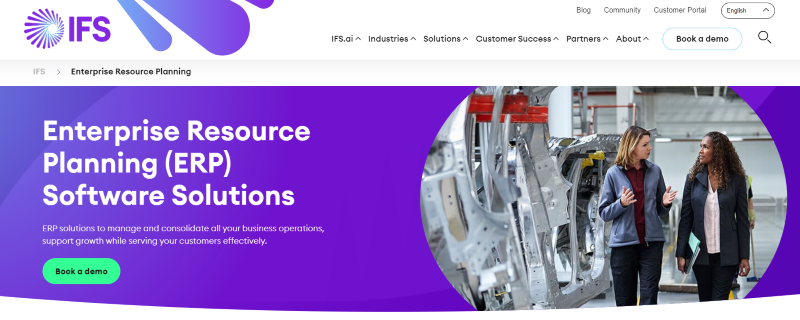
IFS stands out for its user-friendly interface, making it one of the most intuitive systems for navigating and managing your business operations.
While IFS is a strong option for food and beverage companies, its capabilities extend beyond this industry.
By offering robust features for asset management and field service, it is considered a valuable tool for businesses with additional needs outside of food and beverage production.
Main Features
IFS ERP software includes features for:
- Financial Management: Handles all financial operations.
- Field Service Management: Optimizes scheduling and dispatch of field service personnel.
- Work Order Management: Create, manage, and track work orders.
- Project Management: Plans, tracks, and controls projects.
- Manufacturing Scheduling: Optimizes production schedules and resource allocation.
Pros
- IFS can be customized to fit the needs of businesses of various sizes.
- It offers a wide range of features and addresses the diverse needs of most businesses.
- The user-friendly interface allows for quicker adoption.
Cons
- The initial cost might be a deterrent for some potential users.
- Complex features can be difficult to understand and utilize effectively.
Rating

IFS has received a rating of 4 on G2.
5. Deacom ERP
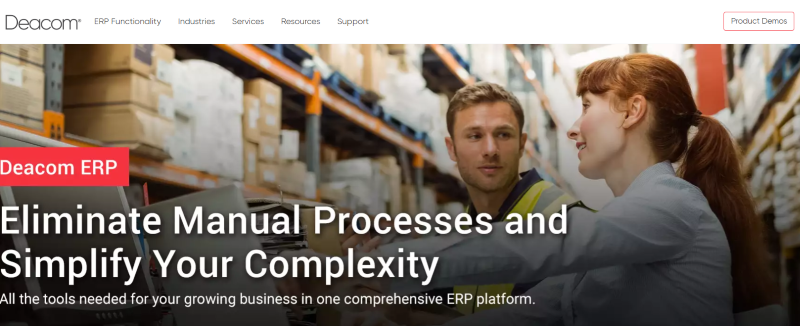
Deacom is an ERP platform designed by ECI Software Solutions specifically for expanding distribution and food manufacturing businesses.
It is a powerful solution for batch processors in the food and beverage industry, including companies producing consumer packaged goods, dairy products, and beverages.
Main Features
- Warehouse Management System (WMS): Through this system, Deacom uses handheld scanners and barcodes to track inventory, including details such as batch numbers and expiration dates.
- E-commerce Platform: Seamlessly integrated with the core system, Deacom allows you to manage customer orders, view sales data, and keep product information consistent across both systems
- Integrated Accounting Suite: With Deacom, you can handle core accounting tasks (accounts payable, invoices, etc.) and use advanced features like financial reporting, cost analysis, and profitability tools.
- Mobile Data Access: The Deacom mobile app allows users to access the system and view key information, even on the go.
- Synchronized Data: Delivery data seamlessly syncs with the main ERP system.
Pros
- Deacom offers unlimited levels of serialization to cater to the specific needs of various businesses.
- Deacom integrates quality control (QC) tests throughout the entire product lifecycle.
- Deacom’s core ERP foundation is built to facilitate regulatory compliance.
Cons
- The cost of Deacom ERP requires a consultation call for a personalized quote.
- New users might face a steeper learning curve due to the software’s comprehensiveness.
- Deacom’s single-system approach offers less flexibility for businesses looking for extensive customization options beyond the system’s functionalities.
Rating

On the G2 platform, Deacom users rate the software 4 out of 5 stars.
6. BatchMaster ERP
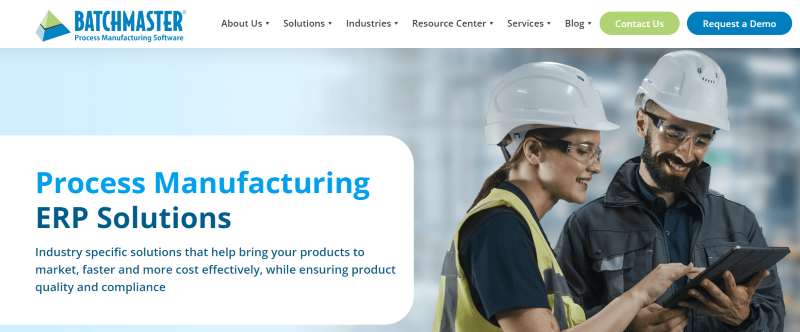
BatchMaster ERP is a unique offering built on the SAP Business One platform. It’s a customized version of SAP Business One specifically tailored for the food and beverage industry.
This means that it uses the core functionality of SAP Business One but adds specific features and functionalities relevant to food and beverage businesses.
Main Features
- Integration: One of BatchMaster’s biggest strengths is its ability to seamlessly integrate with other existing ERP systems you might already use.
This includes back-office systems like Sage and Great Plains as well as finance systems like QuickBooks. - Cost-Effectiveness: With its focus on the food and beverage industry, BatchMaster often proves to be a more cost-effective option compared to other ERP systems.
- Customer Service: While not directly a feature, some users report experiencing better customer service from BatchMaster compared to larger ERP companies.
Pros
- BatchMaster provides customizable process modules that offer a comprehensive view of your entire manufacturing process.
- Its intelligent workflow routing feature automatically adapts the system’s operations to your unique manufacturing needs.
- BatchMaster is known for its excellent training resources.
Cons
- The initial investment can be significant, depending on the number of users and additional modules required.
- BatchMaster’s complexity can make it challenging for new users to learn and master.
- Due to its comprehensive nature, configuring and customizing BatchMaster to your specific needs can be complex.
Rating

Based on user reviews on the G2 platform, BatchMaster ERP receives a rating of 3.6 out of 5 stars.
Optimize Your Food and Beverage Operations with BSUPERIOR
There is no denying the fact that food and beverage manufacturers need powerful tools to optimize their operations and gain a competitive edge.
A modern ERP system, specifically designed for the food and beverage industry, can be the key to unlocking success.
If you’re using an outdated ERP system, it might be holding your business back. Consider auditing your current system to identify potential areas for improvement.
If you haven’t adopted an ERP solution yet, now is the ideal time to explore your options and start reaping the benefits.
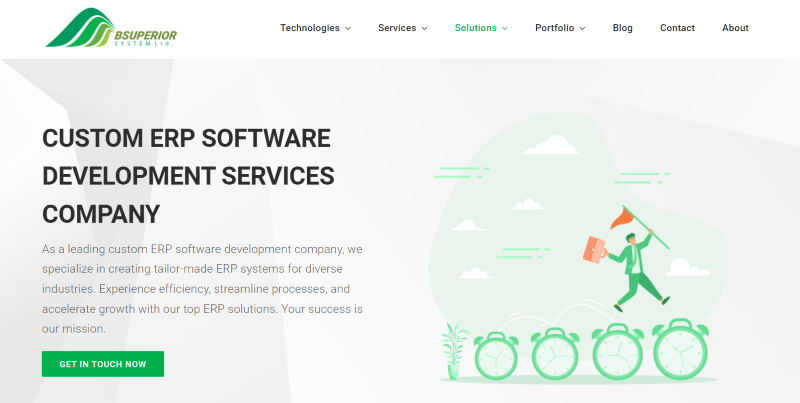
We at BSUPERIOR specialize in developing customized ERP solutions to the unique needs of various industries, including food and beverage manufacturing.
Contact us today and let a member of our team assist you in upgrading your existing system or implementing a brand-new solution that perfectly fits your company’s specific requirements.
We value your input and believe this content may enhance our services. However, it's under review. If you see room for improvement, please use the "Report an issue" button below. Your feedback helps us excel.
Contact us today at –– and speak with our specialist.

